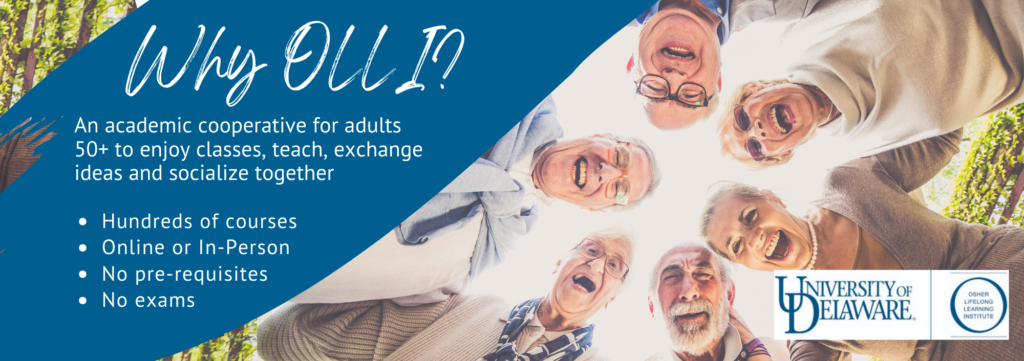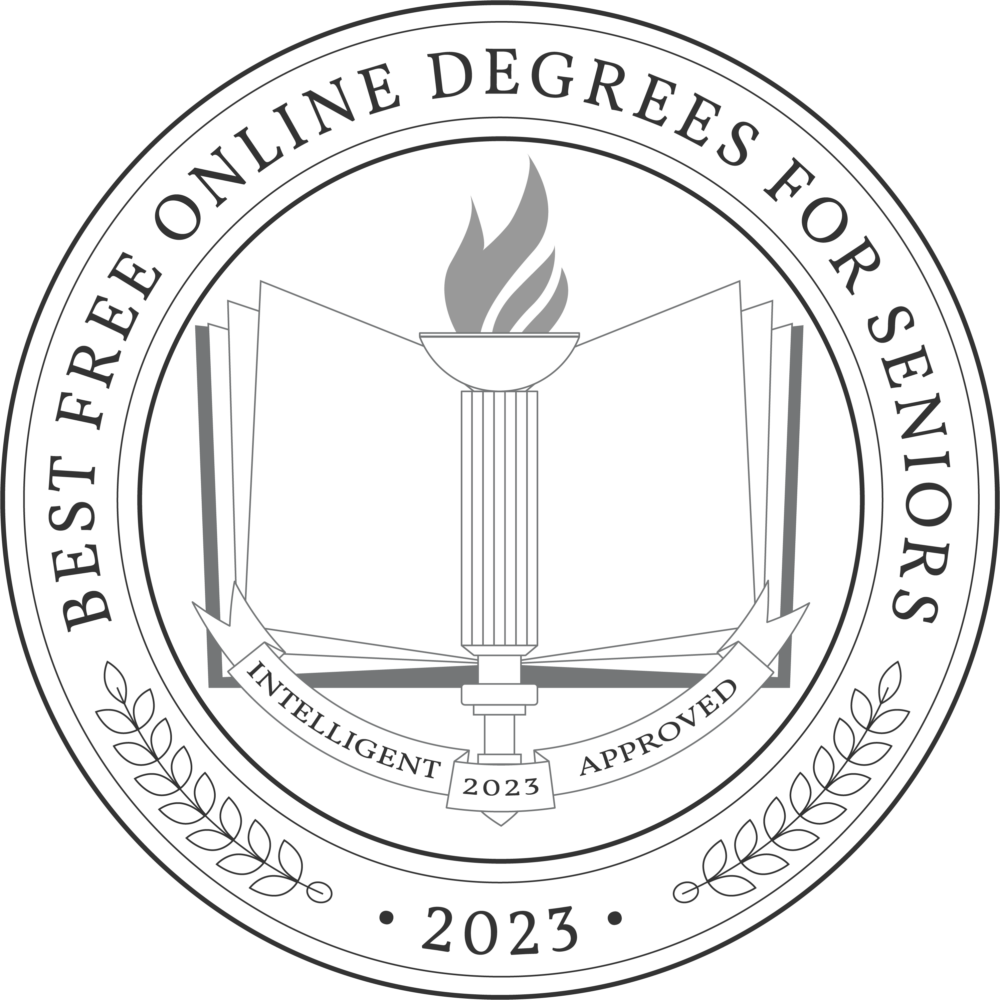Written by Kristen Scatton, Interviews with Blanca Villagomez
Education is a lifelong journey. Whether you’re a senior citizen looking to start or finish a degree, learn new skills for your career, or keep your mind active, there’s likely a free online degree program or course that can help you achieve your goals.
This list includes some of the best free online college degrees for senior citizens, and information about how taking college courses can benefit older adults. Blanca Villagomez, a program coordinator, and counselor at UC-Irvine, also offers her insight into what senior citizens should know about online degrees and courses and how seniors can choose the program that’s right for them.

Why Should Senior Citizens Take College Courses?
“As we age, it becomes increasingly important to keep our brains active and challenged,” Villagomez says. “Learning new information and skills through online courses is a wonderful way to do just that.”
Research shows that for seniors, lifelong learning has a positive impact on psychological well-being. This includes helping senior citizens maintain mental acuity, avoid feelings of loneliness and isolation, and provide a sense of personal fulfillment and satisfaction.
Retirement is a significant life change that can lead to a sense of loss, both of identity and structure. Pursuing an online education can help fill these voids, says Villagomez.
“Online courses require structure, which can be great for recently retired individuals who need a routine in their lives,” she says. “Setting goals, completing assignments, and engaging with course materials can help senior citizens establish a new purpose and sense of accomplishment that can improve their overall well-being. Additionally, senior citizens can discover new interests and passions through online learning.”
Meanwhile, for seniors still in the workforce, online courses are a convenient, flexible way to learn new skills to help them advance in their current field or prepare for a career change.
How to Take Online College Classes for Free as a Senior Citizen
There are several ways for senior citizens to take college classes for free. However, students should note that not all of these paths lead to receiving a degree. Students seeking a degree should consult with an admissions representative to determine the specifics of their intended program and if they’ll have to pay tuition or fees to receive a degree.
Tuition waivers

The most common way for senior citizens to attend college for free is by enrolling in a public university that participates in a tuition waiver program for senior citizens. Nearly all states have programs that allow seniors to waive tuition at state-supported institutions, although specific eligibility requirements vary. Some states only allow seniors to waive tuition at two-year colleges, which only award associate degrees, while others offer tuition waivers for four-year colleges as well. The eligibility age also differs depending on the state and typically ranges from 60 to 65. Students should contact their school directly to find out if the school participates in a state-supported tuition waiver program and what the eligibility requirements are.
Auditing
Another common way for seniors to participate in college classes for free is by auditing a course. Students are typically allowed to audit courses that haven’t reached their enrollment capacity. Many schools allow students to audit a class at no charge. However, it should be noted that, depending on the particular policies of the school and course instructor, auditing a class typically bars a student from full participation. While students can attend classes and complete assignments, they usually don’t participate in assessments like exams and don’t receive a grade for the course. Therefore, auditing courses typically doesn’t lead to a degree.
Free courses/MOOCs
Many prestigious universities, including Harvard, Yale, University of Pennsylvania, Stanford, and more, offer massive open online courses, or MOOCs, through online platforms such as EdX and Coursera. MOOCs allow students from anywhere in the world to learn from top professors and industry experts in a variety of subjects. Most platforms offer a free option, which gives students limited-time access to course materials, and a paid option, which typically awards students a certificate upon successful completion of the course. While MOOCs can be an ideal way to upskill or explore a new subject, they generally do not lead to a full degree.
Discounts
Just like in grocery stores, restaurants, and other businesses, senior discounts also exist for higher education. Many schools offer discounted tuition to seniors who meet certain age or income requirements. Special scholarships may also be available to older learners to help make higher education more accessible.
What Senior Citizens Should Know About Online Degrees and Courses
For senior citizens considering enrolling in an online degree or course, there are a few key things to be aware of to ensure a smooth, successful learning experience.

Technology proficiency
A level of familiarity and comfort with technology is necessary for individuals enrolling in online courses. Students must have a reliable computer as well as high-speed internet access to stream lessons, download course materials, and upload assignments. Most online courses use portals like Canvas or Blackboard to give students access to lessons, assignments, and communication tools like message boards and discussion forums.
Students enrolling in live online classes will also need working cameras and microphones and be comfortable communicating using these tools. They should also be able to troubleshoot connectivity issues to ensure they can log in to classes and submit assignments without complications.
Course delivery formats
There are a few types of delivery methods for online courses. Synchronous classes meet virtually at designated days and times using videoconferencing platforms. These types of classes typically include more real-time interaction between students and faculty, but they require students to adhere to a predetermined schedule.
Asynchronous courses, meanwhile, don’t require students to attend classes at any particular time. In this delivery format, students learn through prerecorded videos, reading assignments, and homework, allowing them to study independently. While asynchronous courses are more flexible, they’re also more autonomous, as students don’t have as many opportunities for real-time interactions with classmates and instructors.
Lastly, some schools or programs offer hybrid classes, including both in-person and online learning components.
Student experience
Given the nature of online learning, the student experience differs from attending an on-campus program. Online courses tend to be more self-directed, especially if they are asynchronous, with students having limited interaction with faculty and classmates. In these types of courses, communication usually happens in the form of emails and online message boards, although some instructors make themselves available via phone or videoconferencing.
While this allows students to focus more of their energy on learning, some students may miss the social aspect and learning support of a traditional classroom environment. Senior citizens who are seeking a social component to their experience should consider synchronous classes with virtual meetings and review the extracurricular options the school provides to remote students.
Associated costs
Even if an online degree or course is free, there will likely be some associated costs students should keep in mind. The most significant expense for online learning is typically technology, including a reliable computer, microphone, camera, and high-speed internet access.
Depending on the area of study, students may also need certain software programs or textbooks. Some tuition-free programs charge students fees for things like tech support or online resources.
How to Choose the Free Online Degree Program That’s Right for You
The first step in choosing the best free online degree for senior citizens is self-reflection and getting clarity on your needs and wants. Seniors who want to explore a new interest or dive deeper into an existing passion may find that one or two courses are sufficient for their needs. Meanwhile, those who want or need a full degree will have to decide what type of degree they want (associate, bachelor’s, master’s) and how much time and effort they can dedicate to their education.
Once you know what you want out of your education, it’s time to research the programs that will fit your needs.
“Online search engines and directories are a great place to start, as they can provide valuable
information about accredited institutions, tuition costs, and course offerings,” Villagomez says. “Another approach is to consult with academic advisors at colleges or universities to discuss specific program requirements and course options.”
Professional organizations and industry associations can also provide information about educational requirements for certain jobs and may also have course offerings related to your area of interest.
Lastly, Villagomez reminds seniors to look to those closest to them for guidance. “Friends and family who have experience with online learning may be able to provide personal recommendations best suited to your needs.
FOR DELAWAREANS–we have the robust course offerings of OLLI (Osher Lifelong Learning Institute) right at our fingertips!!!


The internet is filled with garbage. Yet where do we go when we need answers?
We’re tired of all the garbage, and decided to do something about it. So, we’re sifting through it all to find the buried treasure. We’re talking to experts. We’re analyzing mountains of data. We’re doing whatever it takes to create content that helps you live better.
And to make this possible, we’re committed to finding a business model that doesn’t corrupt the integrity of our content. So you won’t find programmatic ad blocks on our site, nor will you find affiliate disclosures. Oh, and you definitely won’t see any ‘native ads’.
Intelligent.com is a free, privately-supported website that’s editorially independent. This enables us to bring you unbiased, accurate, and fact-based information on a wide range of issues.
Accuracy and Review of Content
Hundreds of experts, educators, advisors, and consumers have been interviewed during the production of our original content. Our content is also periodically checked and reviewed for accuracy.